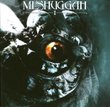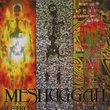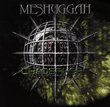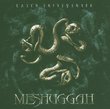| All Artists: Meshuggah Title: Nothing Members Wishing: 1 Total Copies: 0 Label: Avalon Original Release Date: 1/1/2002 Re-Release Date: 8/21/2002 Album Type: Extra tracks, Import Genres: Rock, Metal Styles: Progressive, Progressive Metal, Alternative Metal, Death Metal Number of Discs: 1 SwapaCD Credits: 1 |
Search - Meshuggah :: Nothing
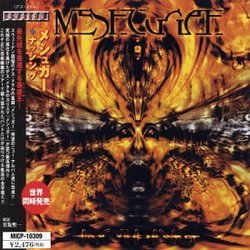 | Meshuggah Nothing Genres: Rock, Metal
Japanese version featuring a bonus track |
Larger Image |
CD DetailsSynopsis
Album Description Japanese version featuring a bonus track Similar CDs
|
CD ReviewsThink of it as a DVD with bonus CD ifutureman | NJ | 04/24/2008 (5 out of 5 stars) "I purchased this reissue/re-recording and took the CD and put it in my disc changer along with the original version of "Nothing," and hit random-play, so I could compare the sound of the two versions. Initially (and for the most part I still feel), my impression was that the guitars do sound a lot better ... but the bottom end (drums and bass) have been toned down a bit in the mix on this new version. Sometimes I think the new mix improves the song, but for other tracks I like the orginal mix better. It's almost as if the new mix is clearer, with the re-recorded guitars more clearly defined. But sometimes, I prefer the older, slightly muddier guitar sound, because it makes the groove even trickier to follow. At the end of the day, I can't exactly argue with the thinking of lead guitarist extraordinaire Fredrick Thordendal, who was apparently the band member most responsible for the decision to re-record the guitars. But I'm not sure I'll ever decide once and for all which version is best. On the other hand, the DVD is a great buy for any Meshuggah fan. Yes, some of the live footage borders on seizure-inducing with the rapid edits, but this is Meshuggah after all. The crazy fast paced video suits the crazy music. The performances are all top-notch; not that this band would ever deliver anything but. The music videos are actually not that interesting, but worth having; of course the video for "New Millenium Cyanide Christ" remains the greatest "air-band" video ever. So if you think of this as a good DVD with a cool new mix of a great album, then I'm sure you'll be more than satisfied with your purchase." A Different Interpretation Christopher Brooks | anywhere according to my wavefunction | 08/09/2009 (5 out of 5 stars) "There is a healthy mix of positive and negative reviews for this one; most of the negative reviews stem from the fact that this album sounds different from the original, which is the reason I give it five stars. If Meshuggah had re-released the original Nothing with negligible difference besides changing to 8-string guitars, I think we all would be pretty disappointed, even though some negative reviews imply the contrary. To get the most out of this album, you have to spend your time listening to it as a new release, rather than every five seconds saying, "Well that part sounds different! I don't like it." The original Nothing and this reissue are two separate works by a great band, and brilliant artistic decisions can be heard in both, regardless of how corresponding songs "stack up" to each other." Standout Album From a Band That Makes Real Music James | Seattle | 08/28/2010 (5 out of 5 stars) "Any Meshuggah fan will agree regarding the difficulty involved in trying to adequately describe and appreciate their music. I asked a fellow metalhead whether he appreciates Meshuggah, and he responded negatively, saying that their music is far too rhythmically focused, but he couldn't argue about their talents. Perplexed by his comment, I nevertheless saw some truth in his assessment - Meshuggah are focused on rhythm to the exclusion of other elements such as melody, harmony, and verse-chorus structure; if one cannot appreciate the percussive nature of each instrument (including vocals), and the tone evoked by the lack of said elements, then he will find relatively little else to enjoy. Still, though rhythm dwarfs melody and harmony, Meshuggah pay a generous share of their efforts to atmosphere. The ambiance of the album here somehow conduces ecstasy within dystopia by way of obsession about the future and the uprise of robotics in contemporary society. The musicians play with a precision and punctuality which any listener should respect. At its best, this music exhilarates for its delivery of polyrhythm and rhythmic flexibility whose subtlety falls on par with that of the best Classical or Jazz, filtered through a death metal aesthetic. This means raspy screaming, crunchy, distorted guitars, and hollow punches on the drum kit, but the mentality which drives the sound operates according to a bleak and cynical vision wrought of an authenticity and discipline that few metal bands can claim, of machines slowing down and speeding up, of factories with minds of their own, and man's important relationship to machinery. Opeth, Tool, The Dillinger Escape Plan, and Cynic all come to mind with their similarly motivated ideas, along with many other technically-minded and heavy bands, but Meshuggah stand apart from their peers. Many of these tracks manipulate time with such inventiveness that they will alter your perception of it irreversibly.
To speak more specifically of Nothing in comparison to other Meshuggah albums, pacing seems to act as the keynote; Nothing slows the thrashier approach of the first few albums in exchange for a spaciousness that allows the music to breathe, and ends up drawing more attention to the band's innovations by lowering the metronome speed. Check out the starting track, Stengah, where a grinding guitar riff followed by drums progresses into a machinelike harmony of rhythm, eventually joined by syncopated, robotic death raps, passing through variations but always remaining consistent to the tone of a future world where man fuses with machine. What other reviewers have noted about Meshuggah (and maybe this album in particular, along with the even more mechanistic Catch Thirty Three) rings true, about how their musical aesthetic emphasizes thought over emotion, offering stimulation of the intellect instead of exploring feelings. Still, I notice an instinctual element to appreciating this music; as the case turns out for other music based on complex rhythms, mathematical analysis does little compared to an intuitive grasp on the flow of these jams. I would bet that much of this material was discovered and created through improvisation, in the fashion of the best Jazz. Meshuggah delivers music played by humans in real time, but their mood comes from atonal melodic and harmonic sensibilities, electronic distortion, and atmospheric effects. Although they carry an electronic vibe, this never sounds like techno, as both the heaviness and the fluidity of the actual musicianship make for an experience that sounds unprocessed. Much of what makes this album (and other Meshuggah releases) so appealing results from the prevalence of polyrhythm and warped time signatures. Polyrhythm means overlaying at least one rhythm on top of another, synchronized to a basic pulse. This means that the music has a beat, but what happens between the beat (when the separate rhythms seem out of sync) becomes not unlike the sensation of aural juggling. Many objects are thrown up in the air at once, but the juggler keeps everything from touching the ground by intervening at a regular rate (this would be the main beat). Another example would be how a horse gallops - all four feet leave the ground and are suspended in the air for a short tone but the animal travels at a predictable pace. Meshuggah also implement changes to the basic rhythm often enough (sometimes in a very subtle manner) to keep the music unpredictable and organic. Anyone who writes off Meshuggah (and this release) as repetitive noise without rhyme or reason suffers from a need for a reality check. Observing the band's arc (from when they began to establish their sound on Contradictions Collapse as of ObZen), we can see them zigzagging across a spectrum, honing in with each release on a new sound, with Catch 33 as the most expansive, and Chaosphere as the most frenetic. Nothing marks an especially balanced release, where styles as diverse as industrial, death, math, psychadelia, prog, and thrash find unlikely harmony. Meshuggah may have ventured too far into the cosmos with Catch 33, and may have spread themselves thin by trying to do too much on ObZen, but Nothing arguably stands as their most mature and balanced recording to date. They let themselves off the hook somewhat from the hyperactive changes and blitzkrieg styles of their earlier work in exchange for a deeper and more consistent sound. 4.5 stars" |

 Track Listings (10) - Disc #1
Track Listings (10) - Disc #1